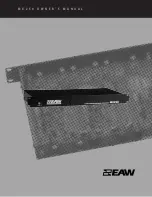MSC8144E Reference Manual, Rev. 3
16-86
Freescale
Semiconductor
Serial RapidIO
®
Controller
16.4.3.4 Programming Errors
Table 16-36 lists programming errors that result in undefined or undesired hardware operation.
16.4.4
Inbound Doorbell Controller
The inbound doorbell controller receives doorbells and places them in a circular doorbell queue
in local memory. The inbound controller controls the enqueue pointer and software controls the
dequeue pointer. After a configured number of doorbells are received, an interrupt is generated to
the processor. After processing a received doorbell, the local processor can either write the
doorbell mode register increment bit (IDMR[DI]]) causing the dequeue pointer to point to the
next doorbell in the queue or wait until all the received doorbells are processed and write the
dequeue pointer.
Notes: 1.
Notes: 1.
These error types are actually detected in the RapidIO port, not in the doorbell controller.
2.
In small transport size configuration using the packet, the following allocations are made:
• LTLACCSR[XA] gets the extended address (packet bits 78–79).
• LTLACCSR[A] gets the address (packet bits 48–76)
• LTLDIDCCSR[MDID] gets 0.
• LTLDIDCCSR[DID] gets the least significant byte of the destination ID (packet bits 16–23).
• LTLDIDCCSR[MSID] gets 0.
• LTLDIDCCSR[SID] gets the least significant byte of the source ID (packet bits 24–31).
• LTLCCCSR[FT] gets the ftype (packet bits 12–15).
• LTLCCCSR[TT] gets the ttype (packet bits 32–35).
• LTLCCCSR[MI] gets 0
In large transport size configuration using the packet, the following allocations are made:
• LTLACCSR[XA] gets the extended address (packet bits 94–95).
• LTLACCSR[A] gets the address (packet bits 64–92).
• LTLDIDCCSR[MDID] gets the most significant byte of the destination ID (packet bits
16–23).
• LTLDIDCCSR[DID] gets the least significant byte of the destination ID (packet bits 24–31).
• LTLDIDCCSR[MSID] gets the most significant byte of the source ID (packet bits 32–39).
• LTLDIDCCSR[SID] gets the least significant byte of the source ID (packet bits 40–47).
• LTLCCCSR[FT] gets the ftype (packet bits 12–15).
• LTLCCCSR[TT] gets the ttype (packet bits 48–51).
• LTLCCCSR[MI] gets 0.
Table 16-36. Outbound Doorbell Programming Errors
Error
Interrupt
Generated
Status Bit Set
Comments
Transaction flow level set to 3
No
None
Undefined operation.
Target interface set to an invalid RapidIO port
No
None
Undefined operation.
Register values changed during operation
No
No
Undefined operation.
Table 16-35. Outbound Doorbell Hardware Errors (Continued)
Transaction
Error
Description
Summary of Contents for MSC8144E
Page 1: ...MSC8144E Reference Manual Quad Core Media Signal Processor MSC8144ERM Rev 3 July 2009 ...
Page 48: ...MSC8144E Reference Manual Rev 3 xlviii Freescale Semiconductor ...
Page 86: ...MSC8144E Reference Manual Rev 3 1 38 Freescale Semiconductor Overview ...
Page 168: ...MSC8144E Reference Manual Rev 3 3 60 Freescale Semiconductor External Signals ...
Page 242: ...MSC8144E Reference Manual Rev 3 5 26 Freescale Semiconductor Reset ...
Page 314: ...MSC8144E Reference Manual Rev 3 8 24 Freescale Semiconductor General Configuration Registers ...
Page 414: ...MSC8144E Reference Manual Rev 3 10 14 Freescale Semiconductor MSC8144E SC3400 DSP Subsystem ...
Page 452: ...MSC8144E Reference Manual Rev 3 11 38 Freescale Semiconductor Internal Memory Subsystem ...
Page 520: ...MSC8144E Reference Manual Rev 3 12 68 Freescale Semiconductor DDR SDRAM Memory Controller ...
Page 1070: ...MSC8144E Reference Manual Rev 3 21 28 Freescale Semiconductor Timers ...

















